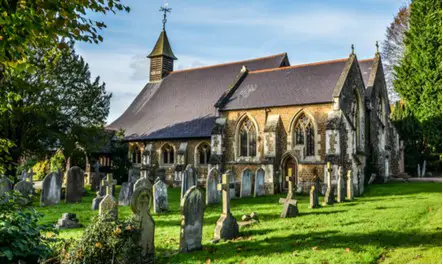The religion of the deceased dictates where a funeral can be held:
- Protestant and Mormon churches will have a funeral regardless of the deceased’s religion
- Catholic churches will rarely have a funeral for a non-Catholic person
- Some Jewish synagogues will have a funeral for non-Jewish spouses
Where to Have a Funeral
When choosing a church for a funeral, it is important to consider several things:
- The religion of the deceased
- The religion of the funeral
- The religion of the worship hall you are considering
Some religions have rules about what types of services can and cannot be held within their places of worship. This article will examine the funeral requirements of the five main religious groups in the United States.
The following table demonstrates how the religion of the funeral/deceased and the religion of the proposed funeral space affect where the funeral can be held. Additional information is provided in the sections below.
| Protestant person | Catholic person | Jewish person | Mormon person | Atheist person | |
| Protestant church | Yes | Yes | Yes | Yes | Yes |
| Catholic church | Only with special permission | Yes | Only with special permission | Only with special permission | Only with special permission |
| Jewish synagogue | Only for approved Jewish ceremony | Only for approved Jewish ceremony | Yes | Only for approved Jewish ceremony | Only for approved Jewish ceremony |
| Mormon church | Yes | Yes | Yes | Yes | Yes |
Having a Funeral in a Protestant Church

Approximately 48.5% of Americans currently identify as Protestant. The Hartford Institute estimates that there are approximately 314,000 Protestant Churches in the United States. Therefore, the chances of there being a Protestant church near you are relatively good.
- If the deceased is Protestant:
Most Protestants choose to have their funeral in a church of their denomination (specific branch of the Protestant Church). However, most Protestant denominations do not require a funeral to be held in a church.
- If the deceased is not Protestant:
Because of the ubiquitous nature of Protestant churches, they are a common location for funerals. Most denominations are willing to rent out their halls for a funeral service, regardless of the religion of the deceased or the funeral service itself.
If you are looking for a Protestant funeral, most churches are willing to provide a Protestant funeral service, even if the deceased was not a baptized and/or practicing Protestant.
Having a Funeral in a Catholic Church

Approximately 22.7% of Americans currently identify as Catholic. The Hartford Institute estimates that there are approximately 24,000 Catholic churches nationwide. Catholic funeral rites consist of three primary elements: the Vigil, the Funeral Liturgy, and the Committal.
- If the deceased is Catholic:
Catholic funeral services are typically held in Catholic churches. However, Catholicism also allows for funeral services to be held at the gravesite or crematorium.
- If the deceased is not Catholic:
The 1983 Code of Canon Law for the Catholic Church identifies three groups of “non-Catholics” for which the Church’s funeral rites may be held:
- Catechumens, or those people who are preparing for baptism or confirmation to join the Catholic Church at the time of their death.
- Children who died before they were baptized.
- Baptized Christians who are enrolled in a non-Catholic Church, provided that their own minister is not available. This includes misters that are either physically unavailable (e.g. no congregation exists locally) or morally unavailable (e.g. when the deceased has not practiced their faith according to a particular denomination or has attended the Catholic Mass with a spouse for a period of time).
The Catholic Church typically limits its halls to Catholic services. However, with special approval from the Bishop, it is sometimes possible to have a non-Catholic ceremony in a Catholic Church.
Having a Funeral in a Jewish Synagogue

Approximately 2.1% of Americans identify as Jewish. According to a 2002 report by the American Jewish Committee, there are 3,727 Jewish Synagogues (also known as temples) in the United States.
- If the deceased is Jewish:
Jewish funeral services can be held at the synagogue, funeral home, or graveside at the cemetery.
- If the deceased is not Jewish:
Jewish synagogues are central to the Jewish faith. There are many rules and regulations about what can occur within the walls of a synagogue. As such, only Jewish services are allowed to be performed within the synagogue.
In general, Jewish funeral services are restricted to members of the Jewish Faith. However, as more Jewish members are marrying people from different religious affiliations, some synagogues are starting to make exceptions for certain non-Jewish individuals.
For example, for spouses that are practicing members of another faith but are to be buried in a Jewish cemetery, the clergyperson of the other faith would perform the funeral, but a rabbi would perform the interment ceremony at the cemetery.
If a spouse is not Jewish, but has been a part of the Jewish family and communal life for a period of time, some synagogues will allow a rabbi to officiate the funeral in the synagogue, as well as the interment at the cemetery.
It is important to note that these exceptions are synagogue-specific. Therefore, if you are planning on a Jewish funeral service or interment, it is important to speak to the synagogue ahead of time.
Having a Funeral in a Mormon Church

Approximately 1.8% of Americans currently identify as Mormon. As of 2019, there were approximately 30,940 Mormon Churches and 161 dedicated temples in the United States. Mormon funeral services are typically run by the Bishop of the ward.
- If the deceased is Mormon:
Mormon funerals are typically held in Mormon churches and are open to both Mormon and non-Mormon attendees. On rare occasions, Mormon funerals will be held in a Mormon temple. Only approved members of the Mormon Church are allowed within the temple; as such, these funerals are rare, as they limit who is allowed to attend the service.
- If the deceased in not Mormon:
Mormon funerals are typically available to the deceased, regardless of whether or not they were a baptized and/or practicing member of the Mormon Church.
Most Mormon churches are also willing to rent out their worship area for funeral services, regardless of the religious affiliation of the deceased or the religion of the funeral.
For more information about Mormon funerals, see our Guide on Attending a Mormon Funeral as a Non-Mormon.
Other Locations for Your Funeral
Though most people choose to have a funeral in a religious place of worship, there are no State, Federal, or religious rules or regulations that dictate that this must be what you choose.
Especially if the deceased was not religious or the family has a blend of numerous religions, having a funeral in a neutral place can be a great alternative.
Some of the most popular non-church funeral locations include:
- Funeral Home
- Crematorium
- Cemetery
- Outdoor Location
- Event Hall
- Home of the Deceased’s Family
- Local Community Center
Things to Consider When Choosing a Funeral Location

When choosing a location for a funeral, it is important to take several things into consideration:
1. Wishes of the Deceased and the Deceased’s Family:
When choosing a funeral location, make sure you prioritize the wishes of the deceased and the deceased’s family. Choosing a location that is important to the deceased and their family will make the funeral service that much more meaningful.
2. Religion of the Deceased:
Before choosing a funeral location, make sure you consider the religion of the deceased. Especially in cases where the deceased’s religion was different from that of the family, it is important to consider both what they would have wanted and what the family wants.
3. Attendees:
When choosing a funeral location, make sure you consider any physical limitations that the attendees may have. For example, outdoor or graveside locations may require greater amounts of walking over uneven ground.
If the attendees, especially those of the immediate family, have physical limitations, it is important to choose a funeral location that they can easily reach.
4. Permits:
Many outdoor locations or event halls will require permits for gatherings. These permits can sometimes take several business days to acquire, and therefore must be handled well in advance.
Prior to choosing a location, make sure that you can acquire all necessary permits prior to the funeral date.
5. Budget:
Every funeral location, including most churches, will charge some sort of fee for using the space. As such, make sure you establish your budget and look into the prices of the locations prior to committing.
6. Convenience:
Many people choose to have funeral services at churches or funeral homes because the space is already accustomed to the process of holding such services.
Therefore, if you choose to have a funeral service at a different location, it is important to make sure you are prepared for the potential added level of decision-making and stress that will come with the planning process.
See Wilson’s Funeral Advice for more information on the funeral planning process.
Popularity of Churches for Funeral Services
There are no State or Federal laws that dictate where a funeral must be held. The majority of religions do not specify that a funeral must be held within the place of worship.
However, in the United States, the vast majority of funerals are held at churches. The main reason is that the United States is a traditionally Christian country.
According to the 2017 Gallup Poll, 48.5% of Americans identified as Protestant, while an additional 22.7% identified as Catholic. It is therefore, not surprising that the majority of funerals are held in churches.
However, as America continues to diversify, the number of mixed-religion families has continued to increase. When you have a family with multiple religious ties, it can be hard to determine where you should hold a funeral.
Understanding which churches are available for your funeral will save you precious time and stress during the funeral planning process.

Sources:
https://www.pewforum.org/religious-landscape-study/
https://news.gallup.com/poll/224642/2017-update-americans-religion.aspx
https://www.bbc.co.uk/religion/religions/atheism/ritesrituals/funerals.shtml
https://18doors.org/jewish_burial_and_mourning_practice_for_non-jewish_relatives/
https://www.burialplanning.com/resources/religious-funerals-guide/non-religious-funerals-guide/
https://www.shiva.com/learning-center/death-and-mourning/jewish-funerals-and-burial/
http://hirr.hartsem.edu/research/fastfacts/fast_facts.html
https://adoremus.org/2018/10/08/q-can-a-catholic-funeral-liturgy-be-celebrated-for-a-non-catholic/

